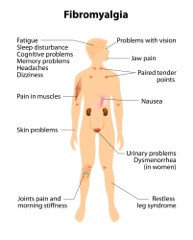 Researchers in Spain recently concluded a review involving fibromyalgia patients that show measurable benefits of dietary changes that could be a potential drug-free intervention helping to ease the symptoms of this treatable but incurable disease.
Researchers in Spain recently concluded a review involving fibromyalgia patients that show measurable benefits of dietary changes that could be a potential drug-free intervention helping to ease the symptoms of this treatable but incurable disease.
According to the review, conducted by scientists at the University of Granada, researchers suggest that fibromyalgia patients would benefit from a specific dietary regime and supplementation, including the elimination of certain foods from their diet, including gluten. The researchers discovered that many fibromyalgia patients were found to have nutritional insufficiencies that potentially aggravated the condition.
Weight management, too, may be very helpful in fibromyalgia management, as many patients are found to be overweight or obese, and those experiencing worsened symptoms tend to be more obese than those with less severe symptoms.
Fibromyalgia, also referred to as FM, is a chronic disorder characterized by widespread musculoskeletal pain, fatigue and tenderness in localized areas, is the most commonly diagnosed musculoskeletal condition after osteoarthritis, according to the National Institute of Arthritis and Musculoskeletal and Skin Diseases.
The study analyzed the benefits of a gluten-free diet on patients suffering simultaneously with fibromyalgia, irritable bowel syndrome (IBS) and celiac disease. Sufferers of FM often times experience multiple chronic conditions including irritable bowel syndrome and celiac disease, which the Spanish study sought to correlate and address. Recent studies show that eliminating gluten in one’s diet can impact fibromyalgia, IBS, and celiac disease occurring simultaneously in people, also known as comorbidity. Comorbidity is the presence of one or more additional diseases or disorders co-occurring with a primary disease or disorder.
IBS is a common gastrointestinal functional disease wherein chronic abdominal pain or discomfort is accompanied by diarrhea, constipation, defecation urgency and bloating. Fibromyalgia patients are often affected by IBS, according to the Spanish researchers, stating that, “…32 to 70 percent of people with fibromyalgia have IBS.” Celiac disease is a condition where the small intestine is hypersensitive to gluten, leading to difficulty in digesting food.
The study, conducted by Drs. Carrasco, García-Leiva, Calandre, and Slim, compared a group of 178 fibromyalgia patients to a control group of 131 healthy participants. The data from the fibromyalgia group was then compared to data in the literature on IBS and celiac patients.
The researchers found that those with fibromyalgia have a higher incidence of fatigue, depression and memory loss than celiac patients. They have a lower incidence of anemia. But in all other aspects — especially gluten sensitivity — they were very much like celiac patients. Based on this, the researchers concluded that food sensitivity might be a cause or contributing factor to a large portion of the symptoms associated with fibromyalgia.


